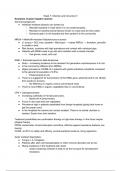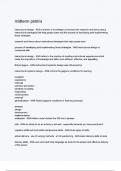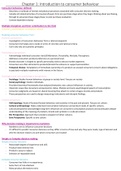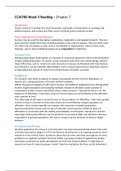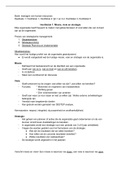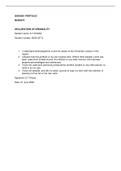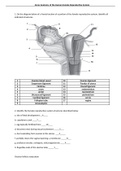Week 7: Infection and immunity IV
Examples of gram-negative species
General background:
● Antibiotic-resistant bacteria can spread via
○ Resistant bacteria in meat when it is not cooked properly.
○ Resistant in bacteria animal faeces remain on crops and are then eaten.
○ Someone gets it in the hospital and then spread it to the community.
MRSA = Methicillin-resistant Staphylococcus aureus
● S. aureus + SCC-mec cassette + MecA gen → makes PBP2a →, therefore, penicillin
is unable to bind.
● Risk factors: countries with high prevalence and contact with colonized pigs.
● Patients with MRSA need to go with strict isolation with a locked chamber.
○ Use gloves, mask, and coat
ESBL = Extended-spectrum bèta-lactamase
● Gram -: increasing incidence to the resistant 3rd generation cephalosporins in E.coli.
● In the community (different from MRSA).
● Higher prevalence of ESBL-E in patients with gastro-intestinal complaints compared
to the general GI population (10.6%).
○ Predominantly E.coli
● There is a suggestive for transmission of the ESBL gene, plasmids and E.coli. Mostly
from poultry to humans.
○ No difference in organic versus conventional meat.
● There is more ESBL in organic vegetables than in conventional.
CPE = Carbapenemases
● Increasing outbreaks in the last past years.
○ Mainly the K.pneumoniea.
● Found in raw meat and raw vegetables
● Prevalence high in patients repatriated from foreign hospitals (going back home to
get the proper care).
● In the hospitals the carriers are contact isolated. There is no locked chamber is
needed. Easier than strict isolation.
Treatment possibilities are combination therapy or high-dose therapy. In the future maybe
phages therapy.
PROS: bactericidal, minimal disruption microflora, effective against resistance bacteria, low
toxicity.
CONS: no RCT on safety and efficacy, encode bacterial virulence, living organisms.
Azole resistant Aspergillus:
● Fungus = A. fumigatus.
● Patients after stem cell transplantation or other immune disorders are at risk.
● Rising resistance in the treatment with Azole.
○ Azole-containing compost is likely to be the hot sport for development
resistance.
Examples of gram-negative species
General background:
● Antibiotic-resistant bacteria can spread via
○ Resistant bacteria in meat when it is not cooked properly.
○ Resistant in bacteria animal faeces remain on crops and are then eaten.
○ Someone gets it in the hospital and then spread it to the community.
MRSA = Methicillin-resistant Staphylococcus aureus
● S. aureus + SCC-mec cassette + MecA gen → makes PBP2a →, therefore, penicillin
is unable to bind.
● Risk factors: countries with high prevalence and contact with colonized pigs.
● Patients with MRSA need to go with strict isolation with a locked chamber.
○ Use gloves, mask, and coat
ESBL = Extended-spectrum bèta-lactamase
● Gram -: increasing incidence to the resistant 3rd generation cephalosporins in E.coli.
● In the community (different from MRSA).
● Higher prevalence of ESBL-E in patients with gastro-intestinal complaints compared
to the general GI population (10.6%).
○ Predominantly E.coli
● There is a suggestive for transmission of the ESBL gene, plasmids and E.coli. Mostly
from poultry to humans.
○ No difference in organic versus conventional meat.
● There is more ESBL in organic vegetables than in conventional.
CPE = Carbapenemases
● Increasing outbreaks in the last past years.
○ Mainly the K.pneumoniea.
● Found in raw meat and raw vegetables
● Prevalence high in patients repatriated from foreign hospitals (going back home to
get the proper care).
● In the hospitals the carriers are contact isolated. There is no locked chamber is
needed. Easier than strict isolation.
Treatment possibilities are combination therapy or high-dose therapy. In the future maybe
phages therapy.
PROS: bactericidal, minimal disruption microflora, effective against resistance bacteria, low
toxicity.
CONS: no RCT on safety and efficacy, encode bacterial virulence, living organisms.
Azole resistant Aspergillus:
● Fungus = A. fumigatus.
● Patients after stem cell transplantation or other immune disorders are at risk.
● Rising resistance in the treatment with Azole.
○ Azole-containing compost is likely to be the hot sport for development
resistance.

